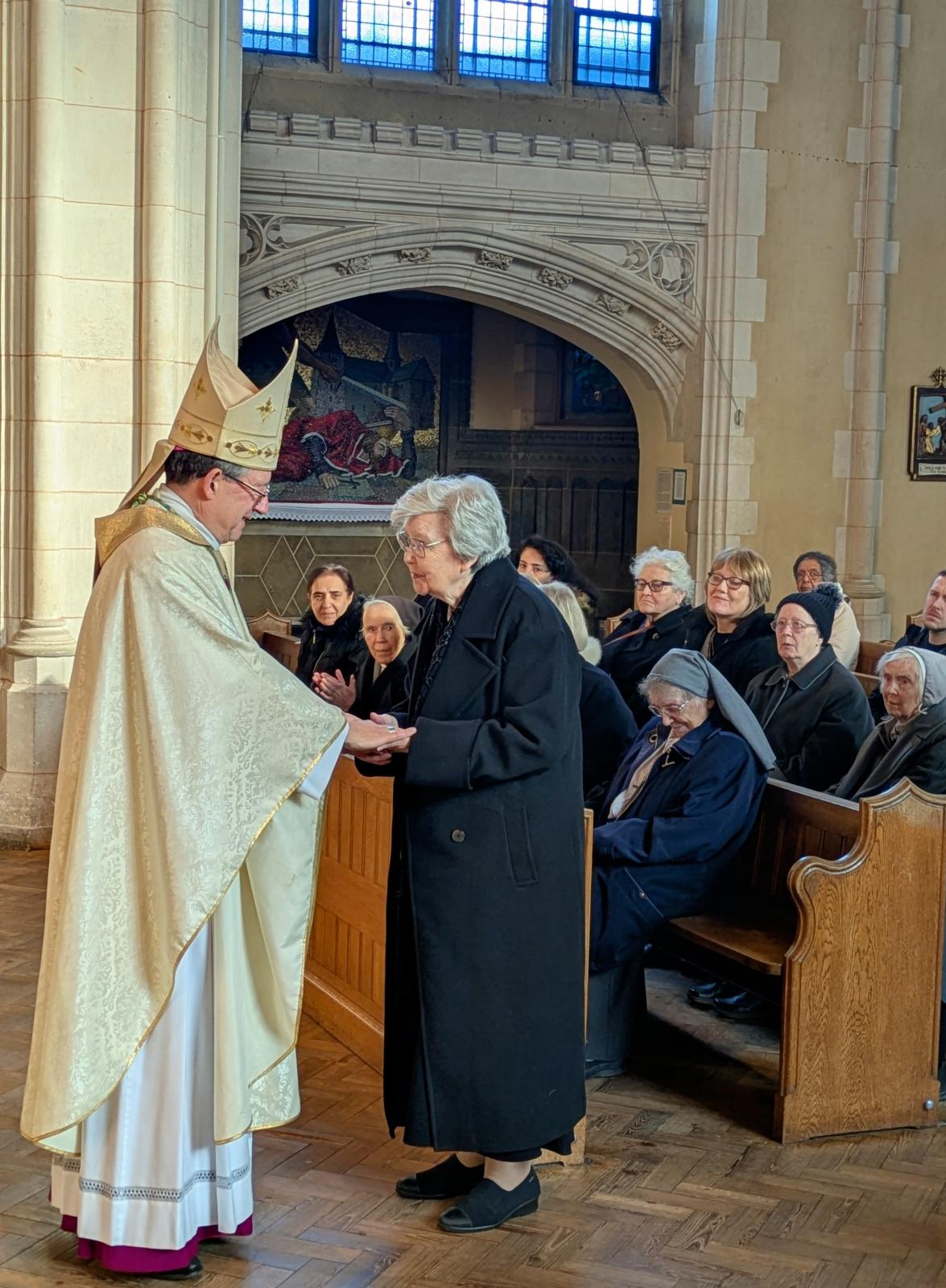Homily given on Tuesday 14 January 2025 at the Mass of Thanksgiving for Service for the Award of the Diocesan Medal to Sr Bernadette Hunston
We celebrate today and we give thanks to God for the many ways in which Sister Bernadette has been a faithful witness to Christ in her work in education and formation at the seminary.
On Sunday we celebrated the feast of the Baptism of the Lord Jesus. Jesus entered the river Jordan where he was baptised by John the Baptist. As he arose from the waters, the Holy Spirit descended upon him and the voice of God was heard saying ‘You are my beloved Son; with you I am well pleased.’ Christ sanctified the waters of the river Jordan and given us the gift of the sacrament and the gift of baptismal water so that at our baptism, sin is washed away and we become a new creation. Christ dwells within us and begins the relationship of love which is fulfilled in the resurrection from the grave. The Holy Spirit pours his gifts into the new person in Christ, strengthens us and we are called the Beloved of the Lord.
Today’s gospel follows the Beatitudes at the beginning of Jesus’ Sermon on the Mount – the charter for baptism and the discipleship of Christ. He is New Moses who ascends the mountain where ‘he opens his mouth’ (in the new translation) to proclaim the Word of God for ‘Man shall not live by bread alone, but by every word that proceeds from the mouth of God (Mt 4:4, Dt 8:3) He teaches his disciples, the beloved of the Lord, that blessings come from God to those who are poor in spirit, those who mourn, the meek, those who hunger and thirst for righteousness, the merciful, the pure in heart who gaze is fixed upon Jesus, the peacemakers, those who are persecuted for righteousness sake and following Christ. The communion of saints presents to us those who have received these blessings whom we long to join. They rejoice and are glad because their reward is great in heaven.
The disciples of Christ share in the eternal Sonship of Christ and are the salt of the earth and the light to the world. We share in their lives through baptism and are invited to bring the wisdom of God into the midst of the world. The salt of Christ’s wisdom makes real through love the kingdom of God. This is the dignity of our baptismal calling which we celebrate whenever we gather around the altar to praise God in the sacrifice of the mass. Salt can lose its taste and become tasteless. The gift of baptism and the integrity of the disciples can be obscured by temptation and sin. The white baptismal garments inevitably become torn, grubby and lose their whiteness. Only the mercy of Christ continues to wash and clean the baptismal garments. We are called to keep the salt in our life so that we may bring the taste of God’s kingdom through the touch of love to others whom we meet day by day. Salt gives the flavour that brings ‘the aroma of Christ’ to others (2 Cor 2:15).
God gives each of the baptised particular gifts to be used for the common good: the gift of wisdom, the gift of knowledge, the gift of faith, the gift of healing, the gift of discernment, the gift of prophecy, and the gift of teaching. Through baptism we become members of the Body of Christ and are his presence in the world. Just as the parts of the body must integrate, we experience with others the joys and the sufferings of the Body of Christ in the world.
In the Body of Christ, the consecrated woman is called to be a sign of God’s kingdom who brings salt to the earth and light to the world. She keeps alive the life of the Beatitudes. As Pope Francis said on the Day for Consecrated Life in 2024, ‘By staying awake in expectation of the Lord, they are able to welcome him in the newness of His coming.’ This is a call to welcome with joy, again and again, the Christ Child in his innocence, tenderness, and fragility. It is a call to see this Child in the poorest and weakest of our society and in those who are most in need. The Pope’s words continue, ‘Let us be restless, let us be moved by the Spirit, like Simeon and Anna. If, like them, we live in expectation, safeguarding our interior life and in conformity with the Gospel, we will embrace Jesus, the light and hope of life.’
